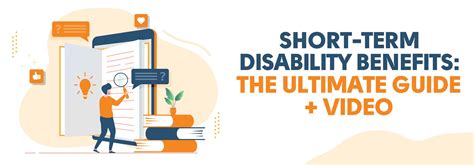A Guide To Short-Term Disability Benefits

Short-term disability benefits are designed to provide temporary financial assistance to individuals who are unable to work due to a non-work-related illness or injury. These benefits can help cover the costs of medical expenses, lost wages, and other related expenses. In this guide, we will provide you with an in-depth look at short-term disability benefits, including what they are, how they work, and how to apply for them.
What are Short-Term Disability Benefits?
Short-term disability benefits are a form of insurance that provides financial assistance to employees who are unable to work due to a temporary disability. This disability can be caused by an illness or injury, and it must be non-work-related, meaning that it did not occur on the job. Short-term disability benefits typically provide a portion of the employee’s salary for a predetermined period of time, usually up to six months.
How Do Short-Term Disability Benefits Work?
Short-term disability benefits work by providing financial assistance to employees who are unable to work due to a temporary disability. To be eligible for these benefits, employees must have a qualifying disability that prevents them from performing the duties of their job. The amount of benefits that an employee receives is typically a percentage of their salary, usually between 50% and 100%. The duration of the benefits varies depending on the policy, but it is typically between three and six months.
How to Apply for Short-Term Disability Benefits
To apply for short-term disability benefits, you will need to follow these steps:
- Notify your employer: You will need to notify your employer as soon as possible that you will be taking time off due to a disability.
- Obtain medical documentation: You will need to obtain medical documentation from your healthcare provider that supports your claim for disability.
- Submit a claim: You will need to submit a claim for short-term disability benefits to your employer or the insurance company that provides your coverage.
- Wait for approval: You will need to wait for your claim to be approved before you can begin receiving benefits.
Who is Eligible for Short-Term Disability Benefits?
Not everyone is eligible for short-term disability benefits. To be eligible, you must meet certain requirements, including:
- You must be employed at the time of your disability
- You must have a qualifying disability that prevents you from performing the duties of your job
- You must have medical documentation that supports your claim for disability
- You must have a policy that provides short-term disability benefits
What Disabilities Qualify for Short-Term Disability Benefits?
Short-term disability benefits typically cover a wide range of disabilities, including:
- Illnesses, such as cancer, heart disease, and diabetes
- Injuries, such as broken bones, sprains, and strains
- Mental health conditions, such as depression, anxiety, and bipolar disorder
- Complications related to pregnancy and childbirth
What is Not Covered by Short-Term Disability Benefits?
Short-term disability benefits do not cover disabilities that are work-related, as these are typically covered by workers’ compensation insurance. Additionally, short-term disability benefits do not cover disabilities that are the result of illegal activity or self-inflicted injuries.
How Much Do Short-Term Disability Benefits Pay?
The amount of short-term disability benefits that you can receive varies depending on the policy. Generally, short-term disability benefits pay a percentage of your salary, usually between 50% and 100%. The duration of the benefits also varies, but it is typically between three and six months.
Do You Pay Taxes on Short-Term Disability Benefits?
Whether or not you pay taxes on short-term disability benefits depends on how the benefits are paid. If you pay the premiums for the policy with after-tax dollars, then the benefits are typically tax-free. However, if your employer pays the premiums for the policy with pre-tax dollars, then the benefits are usually subject to income taxes.
Can You Receive Other Benefits While Receiving Short-Term Disability Benefits?
Yes, you can receive other benefits while receiving short-term disability benefits. However, you may need to coordinate these benefits with your short-term disability benefits to ensure that you do not receive more than 100% of your pre-disability income.
Conclusion
Short-term disability benefits can provide much-needed financial assistance to individuals who are unable to work due to a temporary disability. If you are eligible for these benefits, it is important to understand how they work, how to apply for them, and what disabilities they cover. By following the steps outlined in this guide, you can ensure that you receive the benefits you are entitled to.
FAQs
1. How long do short-term disability benefits last?
The duration of short-term disability benefits varies depending on the policy, but it is typically between three and six months.
2. Do I need to have a doctor’s note to apply for short-term disability benefits?
Yes, you will need to provide medical documentation from your healthcare provider that supports your claim for disability.
No, short-term disability benefits do not cover disabilities that are work-related, as these are typically covered by workers’ compensation insurance.
4. Can I receive other benefits while receiving short-term disability benefits?
Yes, you can receive other benefits while receiving short-term disability benefits. However, you may need to coordinate these benefits with your short-term disability benefits to ensure that you do not receive more than 100% of your pre-disability income.
5. Do I pay taxes on short-term disability benefits?
Whether or not you pay taxes on short-term disability benefits depends on how the benefits are paid. If you pay the premiums for the policy with after-tax dollars, then the benefits are typically tax-free. However, if your employer pays the premiums for the policy with pre-tax dollars, then the benefits are usually subject to income taxes.
